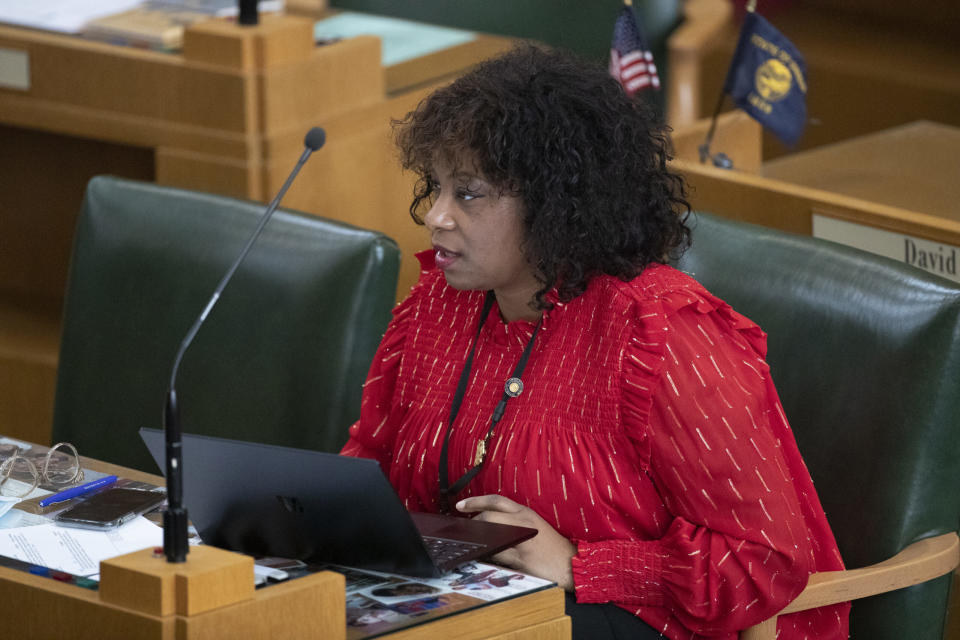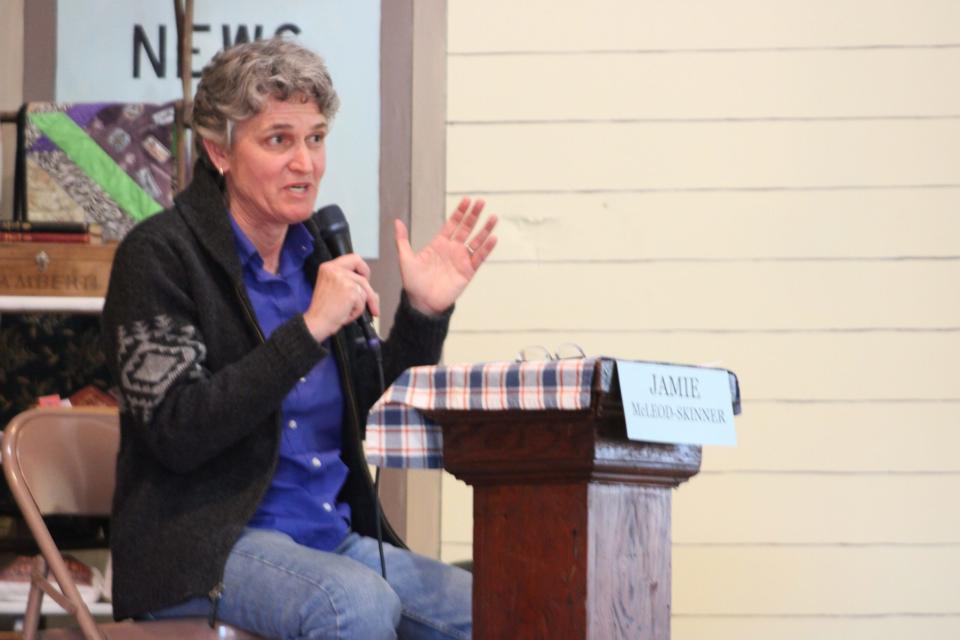Democrats Bynum, McLeod-Skinner battle to take on Chavez-DeRemer in Oregon’s hottest House race

- Oops!Something went wrong.Please try again later.
State Rep. Janelle Bynum, D-Clackamas, is running against 2022 nominee Jamie McLeod-Skinner in the Democratic primary for Oregon's 5th Congressional District. (Campaign photos)
In 2022, fewer than 7,300 votes across four counties gave Oregon its second Republican congressional representative and contributed to Republicans winning control of the U.S. House.
Democrats in Oregon and across the country are now set on defeating first-term Republican Rep. Lori Chavez-DeRemer in the 5th Congressional District, one of a handful of races around the country that could determine which party controls the House. But before they can take on Chavez-DeRemer in November, they have to choose between two standard-bearers.
There’s Jamie McLeod-Skinner, the progressive attorney from central Oregon who unseated former Democratic Rep. Kurt Schrader in 2022 and lost to Chavez-DeRemer. She says she’s better prepared this time around and has grassroots support that her opponent doesn’t.
Or there’s Janelle Bynum, a state representative from Clackamas County who twice beat Chavez-DeRemer in state legislative elections and has racked up endorsements from most prominent Oregon Democrats and every major editorial board. She argues that her legislative track record makes her the best choice to defeat Chavez-DeRemer.
Whoever wins will face a fundraising gargantuan in Chavez-DeRemer, who has consistently outraised other candidates in Oregon and has the ability to fill mailboxes and TV ad breaks with her own messages.
The primary has grown increasingly heated as the May 21 election draws near. Mainstream Democrats PAC, controlled by LinkedIn co-founder Reid Hoffman, supports Bynum and has reserved more than $770,000 worth of ad time to attack McLeod-Skinner, citing reporting by the Capital Chronicle and other outlets about former employees’ complaints that her past campaigns were a hostile workplace. McLeod-Skinner, meanwhile, has spent weeks fundraising off of accusations that Bynum’s vote against extending the timeframe in which survivors of sexual assault can sue their perpetrators in civil court means that women can’t trust her.
Bynum sat for a wide-ranging interview for this piece. Through her campaign manager, McLeod-Skinner put off several requests for interviews and eventually asked for written questions. She did not respond to any of the detailed questions, instead sending a seven-sentence statement.

Janelle Bynum
A little more than a year ago, Bynum was ready to be done with politics.
She had just won her fourth election to the state House, an unexpectedly close race in a redrawn suburban district where pre-election polling indicated that voters were fed up with homelessness, crime and inflation and blamed Democratic incumbents. She was shepherding a $200 million semiconductor incentive package through the Legislature, hopeful that the state’s investments would bring in federal money to grow Oregon’s semiconductor industry and ensure that tomorrow’s engineers wouldn’t be in the same position she was when she moved to Oregon with her husband two decades ago and found no engineering jobs available.
Name: Janelle Bynum
Party: Democrat
Age: 48
Residence: Happy Valley
Education: Master’s of Business Administration from University of Michigan, 2000; bachelor’s degree in electrical engineering from Florida Agricultural & Mechanical University, 1996
Current occupation: State representative, owner of four McDonald’s franchises
Prior elected experience: State representative since 2017
Family status: married, four children
Fundraising: $$1,111,199 as of May 1
Cash on hand: $$339,636 as of May 1
“I was done. I was ready to spend time with my kids. I had run four hard races,” Bynum said. “I was working my butt off, and it’s hard.”
That’s when the calls started. For about eight weeks, Bynum fielded calls from political consultants, fellow politicians, even House Minority Leader Hakeem Jeffries, D-New York, all asking her to consider running for Congress.
“I think people knew what it was going to take to win the seat back, and they wanted to go with the person that put in the time, could raise the money, had the local grassroots support – and it wasn’t my opponent,” she said. “There were people who weren’t willing to make that bet again, for whatever reason, and they knew I was a hard worker.”
Bynum grew up in Washington, D.C., as the oldest of three children born to teachers. She got her bachelor’s degree in electrical engineering from the historically Black Florida A&M University, interning at Boeing during the summers. After college, she worked at General Motors in Michigan and earned her Master’s in Business Administration from the University of Michigan.
She moved with her husband, Mark, to Oregon in 2002 because her mother-in-law was ready to retire and wanted to sell the McDonald’s franchise she owned to her son. The Bynums now run four McDonald’s locations.
When the 51st state House distirct became available in 2016, Bynum jumped into the race. She handily won a Democratic primary but had a tougher race against Chavez-DeRemer, who at that point had been in local politics for more than a decade and served as mayor for six years. Bynum eked out a 2-point victory in the most expensive state House race in Oregon, then beat Chavez-DeRemer by a larger margin in a 2018 rematch.
Bynum touts her electoral record against Chavez-DeRemer while campaigning, but she also points to her seven years of service in the state Legislature. During that time, she led on major policies including semiconductor incentives and new police accountability laws in the wake of George Floyd’s death and the wave of Black Lives Matter protests that followed.
She also takes a “no wrong door” approach to constituent services: No matter how someone gets in touch with her office or how lost they are, Bynum has instructed her staff to help that constituent get in touch with the right person and continually follow up until the problem’s fixed.
She said she’s most proud of her votes on 2017 and 2023 laws that guaranteed access to abortion and cemented Oregon as the state that does the most to protect abortion rights, as well as her work on semiconductor legislation and a 2019 law in response to racist harassment at a high school basketball game that requires school districts to ban and investigate slurs, insults and other unsportsmanlike behavior.
But McLeod-Skinner in recent weeks has zeroed in on one 2019 vote Bynum took against a law that extended the deadline for adult survivors of sexual assault to sue their assailants. The prior timeframe was two years; Bynum voted against a version of the bill that would have extended it to seven years and for an amended version that settled at five years. In one representative fundraising email, McLeod-Skinner wrote, “There’s no clearer contrast between Jamie McLeod-Skinner and her opponents than on the issue of women’s rights.”
Bynum said that narrative doesn’t match with her own legislative track record.
“It’s easy to cherry pick votes to try to sell a narrative, but the narrative doesn’t work,” Bynum said. “It doesn’t match in any way shape or form, because I have a long history of pro-women votes.”
It’s also important, she added, to acknowledge that everyone experiences life and the justice system differently. As a Black woman, Bynum said she’s worried about her sons being especially vulnerable to false accusations – a fear that’s backed up by research showing that Black people make up more than half of defendants who were wrongfully convicted and later exonerated.
Bynum is the only Black woman in the state Legislature, and if elected she would be the first Black member of Congress from a state that joined the union with a constitutional ban on Black residents. The state amended its constitution nearly 100 years ago to remove that language, but echoes remain: During Bynum’s 2018 re-election campaign, she made national headlines after a constituent called the police to report that her political canvassing – knocking on doors to talk with voters and taking notes after each interaction – seemed suspicious.
She said she’s honest about her experiences, and recognizes that other people have different experiences.
“I’ve tried to work from universal truths,” she said. “We all want what’s best for the next generation. We want women’s bodies and the choices about their bodies to remain with them. We want safety in our communities. I don’t know that those are necessarily Black or white or Asian issues or Latina issues.”

Jamie McLeod-Skinner
McLeod-Skinner is a familiar name to Democratic voters, some of whom have seen her name on ballots every other year since 2018. That’s when the former Santa Clara, California, city councilor took central Oregon by storm, winning a seven-candidate Democratic primary for the 2nd Congressional District by double digits.
Name: Jamie McLeod-Skinner
Party: Democrat
Age: 56
Residence: Terrebonne
Education: Law degree from the University of Oregon, 2016; master’s in city and regional planning from Cornell, 1995; bachelor’s degree in civil engineering from Rensselaer Polytechnic Institute, 1989
Current occupation: Attorney and emergency manager
Prior elected experience: Jefferson County Education Service District board member, 2019-23; Santa Clara, California, City Council member, 2004-12
Family status: Married, four stepchildren
Fundraising: $707,340 as of May 1
Cash on hand: $191,056 as of May 1
At the time, the Republican 2nd District in eastern Oregon included the rapidly growing city of Bend and Deschutes County, which have become more and more liberal in recent years. Buoyed by Bend and a Democratic electorate energized to push back against Donald Trump, McLeod-Skinner performed better than any Democrat had in recent history. She still lost to then-Rep. Greg Walden, R-Oregon, by nearly 17 points.
In 2020, she placed third in the Democratic primary for secretary of state. In 2022, with the 5th Congressional District redrawn to include Bend and McLeod-Skinner’s base of support, she launched a primary challenge against Schrader, a moderate Democrat, trouncing him in the primary by nearly 10 points. She went on to lose to Chavez-DeRemer in the general election by 2 points.
McLeod-Skinner declined to answer written questions about her campaign, including questions about what she would do to ensure a different outcome if she faces Chavez-DeRemer again. Her campaign shared a bulleted list of talking points, including that she raised more money than any other Oregon Democratic congressional candidates in 2022 and that Democratic super PACs left her out to dry in the final weeks before the election while Republican PACs and independent expenditures carried Chavez-DeRemer over the finish line.
In the written statement she sent, she also criticized money in elections.
“Oregon voters want a representative who is accountable to Oregonians and don’t want people from out-of-state and undisclosed sources buying our elections,” she said. “I’m proud of the strong financial investment Oregonians are making in my candidacy and the support I’m receiving from Oregonians across the district.”
McLeod-Skinner also declined to answer questions about her treatment of staff, which has become a major talking point for her critics. The Capital Chronicle reported in October, based on conversations with former staff who spanned campaigns, that employees were afraid of McLeod-Skinner, that she regularly made belittling comments and raised her voice, and that former staff feared that her behavior cost a winnable election in 2022.
Willamette Week followed up in January by reporting on text messages, also reviewed by the Capital Chronicle, that indicated that McLeod-Skinner had punched her campaign driver twice and that the driver was afraid McLeod-Skinner would hit again. In fundraising emails and in taped editorial board interviews with Willamette Week and the Oregonian/OregonLive, McLeod-Skinner has dismissed the allegations as false and coming from the Bynum camp, citing as proof that one named consultant in the Willamette Week story who advised McLeod-Skinner’s 2022 campaign has since worked as an adviser for Bynum. None of the former staff interviewed by the Capital Chronicle were affiliated with Bynum’s campaign.
McLeod-Skinner overcame earlier reports on her behavior as a boss: She was fired in 2017 after four months as city manager of the small town of Phoenix following complaints from department heads. She described it as a politically motivated firing, and while the issue came up in her 2018 campaign, it wasn’t a dealbreaker for voters.
McLeod-Skinner holds a law degree from the University of Oregon and a master’s degree in engineering from Cornell, though she has spent most of the past six years focused on political campaigns. She served for six months in 2021 as the interim city manager of Talent as the small community rebuilt from the most destructive wildfire in state history. In 2023, before she decided to run for Congress again, she was a finalist to head the Oregon Department of Environmental Quality and expressed interest in being appointed as secretary of state.
She frequently cites her experience living and working in rural areas – McLeod-Skinner and her wife, Cass, live on a ranch just outside the district’s boundaries in rural Jefferson County – as an asset in the 5th District, which stretches from Portland and its suburbs across farmland in Marion and Linn counties, over the Cascade mountains and into increasingly urban Bend.
“I’ve been honored to build relationships and trust with Oregonians through my work bringing people together, in both urban and rural communities, to get things done,” she said in her statement. “We are driven by a commitment to help our communities build a better future and protect our democracy and fundamental freedoms, and this is motivating for Oregon workers, families, seniors, veterans, and students.”
GET THE MORNING HEADLINES DELIVERED TO YOUR INBOX
The post Democrats Bynum, McLeod-Skinner battle to take on Chavez-DeRemer in Oregon’s hottest House race appeared first on Oregon Capital Chronicle.

